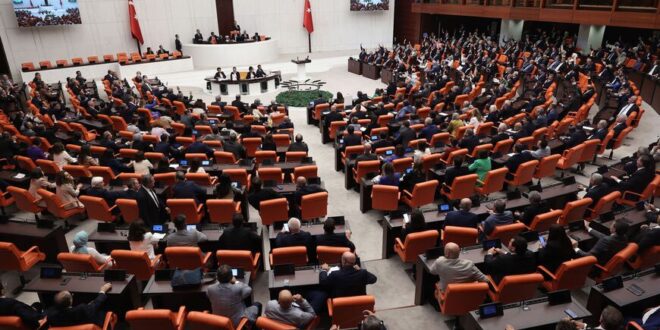The Turkish parliament’s extension of the mandate for another two years comes amid rising tensions between Turkey and the United States.
Turkey’s parliament voted on Tuesday to extend the mandate that allows its security forces to launch cross-border operations in Syria and Iraq for another two years.
The 600-seat Turkish parliament passed the mandate with 357 for and 164 against votes, which allows Turkey to send troops to Syria and northern Iraq.
The extension comes after Turkey’s large-scale air offensive in northern Syria this month targeting dominant Syrian Kurdish groups.
Erdogan’s ruling coalition largely voted for the bill with several opposition parties including the nationalist Good Party and liberal-leaning DEVA also announcing their support.
Turkey’s pro-opposition Republican People’s Party (CHP) and Pro-Kurdish Green Left Party, meanwhile, remained opposed to the extension.
Erdogan requested the extension, citing the “terrorist threats and security risks” that “all terrorist organizations in Iraq and Syria pose.” Under the mandate, which first came into force in 2014 and has been extended several times, Turkey conducted multiple ground incursions in Syria and Iraq.
The extension comes as Erdogan renewed his threat to set up a 30-kilometer-deep (some 19 miles) buffer zone beyond Turkey’s Syria and Iraq borders in response to a suicide bombing attack on Turkey’s national police headquarters in Ankara on Oct 1. The outlawed Kurdistan Workers Party (PKK), which has been fighting the Turkish forces for self-rule inside Turkey since 1984, claimed responsibility for the attack.
In retaliation for the attack, the Turkish security forces earlier this month unleashed a large-scale air offensive against the northern Syrian areas held by the US-allied Syrian Democratic Forces (SDF).
The SDF, in turn, denied any connection with the attack and accused Turkey of destroying civilian structures in the area including power grids, potable water stations and schools.
Turkey, which considers the SDF a threat to its national security as ranks of its backbone, People’s Protection Units, is largely composed of former PKK militants, is pressing Washington to cut off its alliance with the Syrian Kurdish-led group, which is the main ally of the US-led international coalition in the fight against the Islamic State.
In the aftermath of the Ankara attack, Turkey’s Foreign Minister Hakan Fidan declared all infrastructures in the SDF-held areas “legitimate targets” and advised third countries to remain clear from those targets in an apparent warning to the roughly 900 US troops deployed in the region.
The next day a US F-16 shot down an armed Turkish spy drone after it came as close as 500 meters (some 546 yards) to a coalition base in the northern Syrian province of Hasakah. The Pentagon described the downing as “regrettable,” while Ankara blamed the incident on a varying technical assessment of the deconfliction mechanism.
The first such confrontation between the two NATO allies has plummeted Ankara and Washington ties, which are already tense over Ankara’s delaying Sweden’s NATO bid.
In a statement last week, the White House announced it extended a 2019 national emergency on Syria, citing Turkey’s actions in the region that “endangers the lives of civilians, and further threatens to undermine the peace, security and stability.”
Lashing out at the extension last Friday, Erdogan said the United States’ actions in Syria were posing an “extraordinary threat” to Turkey’s national security. “How can you do such a thing?” Erdogan asked over the downing of the drone. “There is a security problem between us.”
 Eurasia Press & News
Eurasia Press & News




